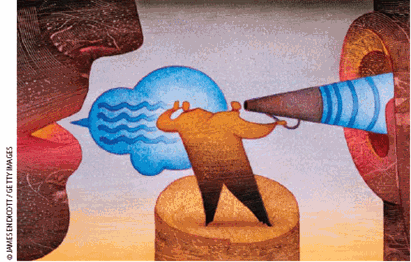PDF of Communication Challenges 0610
THE CHALLENGE
I remember his name because it was unusual: Wyatt. He was in 4515, a corner room with large windows. I remember an afternoon in late fall, and the light filtering into the room had the distinct brightness of the sun low in the sky.
“I don’t have much longer, do I?” he asked.
I’d been a nurse for a dozen years, but I was new to oncology nursing. His question frightened me. My mind filled with what I had learned about appropriate responses to patients’ questions, yet my thoughts were jumbled and conflicted too. Be honest versus be kind. Follow the patient’s lead versus don’t tell him anything he didn’t already know. I was uncomfortable with the silence and rushed to fill it.
“You’re not doing as well as last hospitalization,” I said.
“Maybe a few weeks left. What do you think?”
 When I recall that afternoon, I see him sitting up in bed, his fingers picking at the blanket and his eyes avoiding mine. His lung cancer had metastasized, and his trips back to the hospital were occurring more frequently and lasting longer. I answered his question with a weak response, not wanting to agree too heartily. “Doesn’t look good,” I said. It was the closest I could come to benign affirmation.
When I recall that afternoon, I see him sitting up in bed, his fingers picking at the blanket and his eyes avoiding mine. His lung cancer had metastasized, and his trips back to the hospital were occurring more frequently and lasting longer. I answered his question with a weak response, not wanting to agree too heartily. “Doesn’t look good,” I said. It was the closest I could come to benign affirmation.
When I left his room, I felt surprisingly courageous. I’d answered his question, even though I’d been afraid. I was there for him.
The next day, I got an angry call from Wyatt’s oncologist. Why had I told Wyatt he had only a few weeks left? Why did I think it was okay to take away his hope? I didn’t know how to explain. When I think back to the exchange with Wyatt and my conversation with the physician, I’m not sure I was wrong to respond as I did. I’m not even sure if there was a right or wrong way to handle his question.
A few years earlier, when my oldest son was 6, he asked me, “Mommy, where do babies come from?” I stood at the sink doing dishes. The sunlight filtered through the kitchen window and onto the sink full of dishwater. This was the question I was afraid of, the one I knew would come up eventually, but at age 6?
I turned to look at him, a serious little boy wanting information from the person he expected to have the correct answers. I gave him a sanitized, scientific explanation, then nodded to myself in approval. I’d answered the tough question. I’d been honest and oh-so-modern in my response. Yet I saw a perplexed look on his face.
“What, honey?” I asked.
“James says babies come from the hospital, but I told him they come from heaven.” It turned out there was not one correct answer. And no incorrect answer either. Babies come from the hospital. They also come from heaven. And my practical scientific answer was also correct. Yet his question wasn’t answered. His question wasn’t about where babies came from. His question was, “Who is right—James or me?”
THE STRATEGY
I should have learned my lesson after that conversation. I should have known that when a question leaves me speechless, I need to wait to respond. It is easier to rush to answer when the situation is uncomfortable. But a pause gives me time to think. I start by remembering that the patient chose to ask his question of me. He thought I was the one who could answer him. I needed to remember the courage it took for him to ask. There is talk nowadays about the teachable moment. Those difficult questions are teachable moments. Wyatt was vulnerable, asking for my expertise even while I shook in my shoes and wondered if I was up to the task.
Often, someone asks me an important question when I am most distracted. Wyatt waited until my hand was on the door, the distraction and nonchalance of his timing belying his inner terror. Studies show that the nurse is the most trusted member of the health care team, the translator of things medical. Many patients will ask their nurse what they are afraid to ask their doctor. Listening is an important skill. If I shuffle the letters of the word listen, they spell the word silent. It is important to be silent, to tolerate the awkward space, before asking for clarification.
With Wyatt, I might have started my response by validating him: “I’m glad you are asking questions.” Now, when faced with these situations, my motto is Explore, don’t ignore. My next question might be, “What is your biggest concern?” If he had asked, “Am I dying?” I might have explored what he meant by saying, “What do you think?” I had to trust Wyatt. He asked the question, and he wanted an answer. He wanted to know.
THE OUTCOME
The questions cancer patients ask may still frighten me, but now I have more ideas about how to answer them. With patients like Wyatt, I try to provide a therapeutic presence by stopping what I am doing and focusing in. I listen attentively and work to decrease the patient’s sense of isolation. I need to do more than answer the question at hand; I try to answer the question behind the question. I can do that only by tolerating the difficult questions, by allowing that uncomfortable gap to exist, by exploring. I need to be sure that the Wyatts I take care of feel that I’ve heard their question. To be asked this kind of question is a privilege, not something to be avoided or rushed past. This approach, of listening and exploring, requires adjustment and constant reassessment to improve it, to learn from it, and to build on it. Only then does it become another part of my arsenal as an oncology nurse—for all the Wyatts I care for. ONA
Ann Brady is Symptom Management Care Coordinator at the Cancer Center, Huntington Hospital, Pasadena, California.
